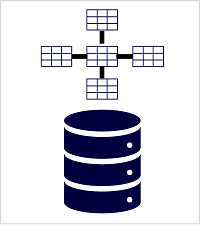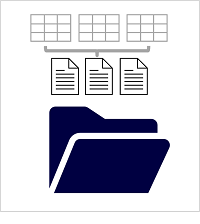You can create and run pipelines using Azure Data Factory, or you can use the same pipeline engine in Azure Synapse Analytics if you want to manage all of the components of your data warehousing solution in a unified workspace.
An input dataset provides the source data, and activities can be defined as a data flow that incrementally manipulates the data until an output dataset is produced. Pipelines use linked services to load and process data – enabling you to use the right technology for each step of the workflow. For example, you might use an Azure Blob Store linked service to ingest the input dataset, and then use services such as Azure SQL Database to run a stored procedure that looks up related data values, before running a data processing task on Azure Databricks or Azure HDInsight, or apply custom logic using an Azure Function. Finally, you can save the output dataset in a linked service such as Azure Synapse Analytics. Pipelines can also include some built-in activities, which don’t require a linked service.
analytical data stores
Data warehouses

A data warehouse is a relational database in which the data is stored in a schema that is optimized for data analytics rather than transactional workloads. Commonly, the data from a transactional store is transformed into a schema in which numeric values are stored in central fact tables, which are related to one or more dimension tables that represent entities by which the data can be aggregated. For example a fact table might contain sales order data, which can be aggregated by customer, product, store, and time dimensions. This kind of fact and dimension table schema is called a star schema; though it's often extended into a snowflake schema by adding additional tables related to the dimension tables to represent dimensional hierarchies.
Data lakes

A data lake is a file store, usually on a distributed file system for high performance data access. Technologies like Spark or Hadoop are often used to process queries on the stored files and return data for reporting and analytics. These systems often apply a schema-on-read approach to define tabular schemas on semi-structured data files at the point where the data is read for analysis, without applying constraints when it's stored. Data lakes are great for supporting a mix of structured, semi-structured, and even unstructured data that you want to analyze without the need for schema enforcement when the data is written to the store.
Azure services for analytical stores
 Azure Synapse Analytics is a unified, end-to-end solution for large scale data analytics. It brings together multiple technologies and capabilities, enabling you to combine the data integrity and reliability of a scalable, high-performance SQL Server based relational data warehouse with the flexibility of a data lake and open-source Apache Spark.
Azure Synapse Analytics is a unified, end-to-end solution for large scale data analytics. It brings together multiple technologies and capabilities, enabling you to combine the data integrity and reliability of a scalable, high-performance SQL Server based relational data warehouse with the flexibility of a data lake and open-source Apache Spark. Azure Databricks is an Azure implementation of the popular Databricks platform. Databricks is a comprehensive data analytics solution built on Apache Spark, and offers native SQL capabilities as well as workload-optimized Spark clusters for data analytics and data science. Databricks provides an interactive user interface through which the system can be managed and data can be explored in interactive notebooks. Due to its common use on multiple cloud platforms, you might want to consider using Azure Databricks as your analytical store if you want to use existing expertise with the platform or if you need to operate in a multi-cloud environment or support a cloud-portable solution.
Azure Databricks is an Azure implementation of the popular Databricks platform. Databricks is a comprehensive data analytics solution built on Apache Spark, and offers native SQL capabilities as well as workload-optimized Spark clusters for data analytics and data science. Databricks provides an interactive user interface through which the system can be managed and data can be explored in interactive notebooks. Due to its common use on multiple cloud platforms, you might want to consider using Azure Databricks as your analytical store if you want to use existing expertise with the platform or if you need to operate in a multi-cloud environment or support a cloud-portable solution. Azure HDInsight is an Azure service that supports multiple open-source data analytics cluster types. Although not as user-friendly as Azure Synapse Analytics and Azure Databricks, it can be a suitable option if your analytics solution relies on multiple open-source frameworks or if you need to migrate an existing on-premises Hadoop-based solution to the cloud.
Azure HDInsight is an Azure service that supports multiple open-source data analytics cluster types. Although not as user-friendly as Azure Synapse Analytics and Azure Databricks, it can be a suitable option if your analytics solution relies on multiple open-source frameworks or if you need to migrate an existing on-premises Hadoop-based solution to the cloud.